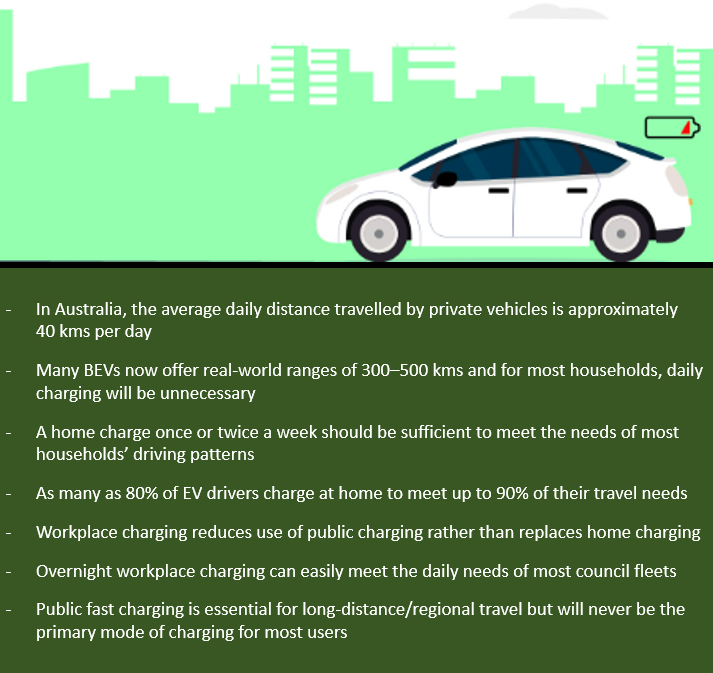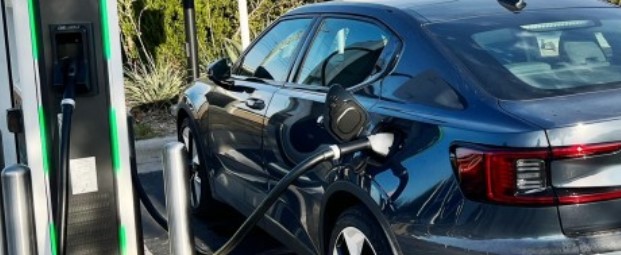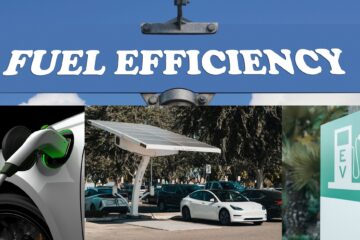Charging Infrastructure
As the take-up of electric vehicles broadens across our communities, councils will receive ongoing requests and applications for the provision of public charging infrastructure. To prepare for these requests and applications, councils should consider and develop a comprehensive charging infrastructure strategy.
While the strategy should cater for the charging needs of the council’s corporate fleet, it should also explore its role in addressing the following charging opportunities:
Workplace Charging for Staff
Councils should consider providing:
- charging stations at council offices and community facilities for employee use – this supports staff who commute using EVs and aligns with broader sustainability and employee benefit initiatives; and
- free or discounted charging for council employees to encourage EV adoption within the workforce.
Residential Charging Support
Councils should consider providing:
- kerbside charging stations for residents without off-street parking to support EV adoption among residents living in high-density housing/apartments; and
- dedicated charging stations in residential areas for shared use by nearby residents – these can serve as an alternative for those who cannot charge at home.
Destination and Tourism Charging
Councils should:
- consider providing charging stations at or near visitor/tourist attractions, parks, museums, beaches and heritage sites to cater for visitors driving EVs; and
- collaborate with event organisers to provide temporary charging stations for community events/festivals – these can be deployed as needed, ensuring EV drivers have access during high-traffic periods.
Transit-Oriented Charging
Councils should collaborate with state government public transport agencies to install charging infrastructure at train stations, bus depots and park-and-ride facilities to enable commuters to charge their EVs while using public transport within the municipality.
Commercial and Retail Partnerships
Councils should collaborate with local businesses to provide:
- charging stations at shopping malls, business parks and commercial centres – shared funding models can reduce council costs while improving charging accessibility; and
- charging infrastructure in areas with high commercial vehicle activity, supporting electric delivery vans, trucks and logistics operators.
High-Speed Highway Charging
Councils should collaborate with state and federal government road agencies to install high-speed chargers along major roads and highways passing through the council’s jurisdiction.
Charging for Car-Share Services
Councils should facilitate the provision of charging infrastructure for shared EVs, such as car-sharing services operating within council boundaries.
Heavy Vehicle and Freight Charging
Councils should facilitate the provision of chargers in industrial and freight zones for the growing adoption of electric freight vehicles.
Emergency and Resilience Charging
Councils should collaborate with state government emergency management agencies to provide:
- off-grid charging options, such as solar-powered units with battery storage, for emergency use during natural disasters or power outages; and
- charging stations dedicated to electric ambulances, police vehicles or fire trucks as councils electrify their emergency response fleets.
Educational and Outreach Initiatives
Councils should collaborate with local educational institutions to provide EV chargers at schools, colleges and universities to support staff, students and community members.
Special Access and Inclusion Charging
Councils should:
- facilitate the design and installation of charging stations with features for people with disabilities, such as wider spaces, lower-mounted chargers and user-friendly interfaces; and
- offer discounted or priority access for seniors or individuals with limited mobility to access chargers at council buildings and community facilities.
Comprehensive EV Charging Strategy
Councils should adopt a comprehensive EV charging strategy that addresses the diverse needs of their fleets, local residents, businesses and visitors. By considering these additional types of charging infrastructure, councils can enhance community sustainability, support economic development, and future-proof their regions for the widespread adoption of electric vehicles.
About Us
Ravim RBC is a strategic consultancy based in Melbourne. We have been assisting councils around Australia since 2014 with service planning and reviews.
As delivery of many council services is enabled by fleet, plant and equipment, we have significant exposure to fleet matters. We also support Uniqco Australasia in performing fleet service reviews and developing net-zero fleet transition plans.
Leveraging our experience, we are planning an EV Fleet Expo to assist councils with their transition to low/zero-emissions fleet assets.






0 Comments